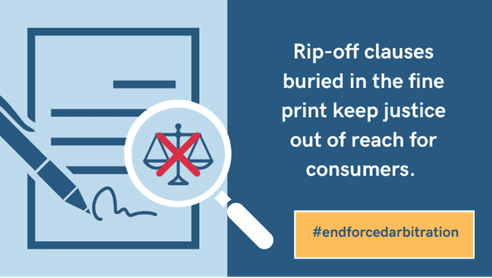
Congressman Hank Johnson (Ga.) and Senator Richard Blumenthal (Conn.) this month reintroduced the Forced Arbitration Injustice Repeal (FAIR) Act to ban forced arbitration in consumer, employment, civil rights, and antitrust cases. The reintroduction comes at a time when the federal government is stepping back from consumer protection, which makes restoring consumers’ freedom to resolve disputes before a judge and jury more critical than ever.
Corporate bad actors have long relied on forced arbitration clauses in the fine print of their one-sided nonnegotiable contracts to avoid accountability when they break the law. These five recent cases illustrate some of the many ways forced arbitration is preventing consumers from accessing justice and why Congress must pass the FAIR Act.
AI chatbot company forced family of alleged minor victims out of court
The family of a 17-year old and 11-year old filed suit in early 2025 against Character Technologies, which operates popular AI chatbot Character.AI. According to the family’s filings, the chatbot allegedly encouraged their son to self-harm and exposed their daughter to inappropriate sexual content. In April, Character Technologies filed a motion to compel arbitration and pointed to the fact that both children had clicked “Accept” on the chatbot’s terms and conditions. The court granted Character Technologies’ motion and the case was sent to arbitration where it will now proceed behind closed doors.
Messaging platform says alleged grooming victim should be sent to arbitration
In May, a 16-year-old girl filed suit against messaging app Discord and online gaming platform Roblox in federal court alleging that the sites facilitated grooming and exploitation of minors. According to her filed legal complaint, the girl was repeatedly exposed to dangerous online situations beginning when she was 10 and culminated in an in-person meeting with an adult predator. In September, Discord filed a motion to compel arbitration, stating that the girl had agreed to its terms of service and that minors could make valid contracts under the relevant law.
Ticketing giant continues to press for arbitration even after defeat in appeals court
In 2022, a group of consumers filed a class action complaint against the parent company of ticketing platform Ticketmaster in federal court, alleging anticompetitive practices. While the case was ongoing, Ticketmaster unilaterally and retroactively changed the arbitration rules in its terms and chose a new arbitration provider that would make decisions in favor of the company. Late last year, the Ninth Circuit Court of Appeals found that the arbitration clause was procedurally and substantively unconscionable and that the case could proceed in court. Ticketmaster has since submitted a petition asking the Supreme Court to take up the case and modified its forced arbitration clause, still seeking to keep claims against it out of court.
Servicemembers forced into arbitration despite special protections
A group of servicemembers brought a class action suit against Citibank in federal court in 2022 alleging that it violated the Servicemembers Civil Relief Act (SCRA) by charging them excessive interest on balances they accrued while on active duty. Under the SCRA, servicemembers are explicitly authorized to bring class actions to enforce their rights. However, in January, the Fourth Circuit Court of Appeals ruled that the language of the SCRA did not override the Federal Arbitration Act and that the case could be forced into arbitration.
Tesla seeking to force auto buyer into arbitration over “shortfunding” mistake
In February, a Colorado consumer filed suit against Tesla Motors in federal court alleging that Tesla was attempting to force her to sign a new, more expensive financing contract. According to the consumer’s filed legal complaint, Tesla mistakenly sold her contract to a third-party financing company for less than intended and had threatened to repossess the vehicle if she did not refinance. Tesla has since filed a motion to compel arbitration in the case and if it is granted, the consumer will no longer be able to continue her claim in court.
—-
In these cases, an individual or group of individuals sought to bring their claims to a public court where they would be heard by a judge and jury. But now they can only seek remedies in closed-door, private arbitration where they will have fewer procedural protections and limited appeal rights, and where the proceedings will be kept out of the public eye. In the interests of justice and basic fairness, Congress must act to ensure arbitration is freely chosen rather than forced upon consumers.
NACA's
Practice Areas
Browse Our
Attorney Directory
Press Inquiries
For press inquiries, contact Ira Rheingold.
To be added to our press/media mailing list, please contact Christine Hines.

